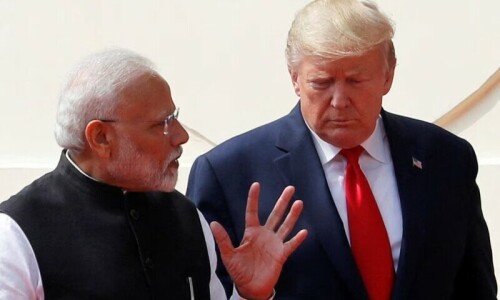For nearly three decades, U.S. presidents from both parties treated India as a rising partner, choosing to set aside disputes in the interest of building a democratic counterweight to China. That approach has shifted dramatically under Donald Trump.
This month, Trump slapped 50 per cent tariffs on a wide range of Indian goods, arguing that New Delhi’s purchases of Russian oil are effectively financing Moscow’s war in Ukraine. His trade adviser Peter Navarro went so far as to call Ukraine “Modi’s war” in a televised interview.
The move risks undoing years of bipartisan efforts to cultivate closer ties with India, which was long aligned with Moscow during the Cold War but has steadily drawn closer to Washington since the 1990s.
A strained personal bond
Prime Minister Narendra Modi and Trump once seemed to enjoy a close relationship. In 2020, Modi welcomed Trump before a cheering crowd of more than 120,000 at the world’s largest cricket stadium. But that warmth has faded.
Trump has irked New Delhi by publicly taking credit for de-escalating tensions with Pakistan earlier this year, even hinting that his role was worthy of a Nobel Prize. India, which firmly rejects outside mediation on Kashmir, bristled at the remarks. Meanwhile, Pakistan has seized the opening, with its army chief visiting Trump at the White House.
Breaking consensus
The tariffs represent a major departure from decades of U.S. policy. Jake Sullivan, who served as national security adviser under Trump’s predecessor Joe Biden, said Trump’s “massive trade offensive” breaks with a long-standing bipartisan consensus.
Analysts say India now faces a stark lesson. Tanvi Madan of the Brookings Institution noted that Washington had long reassured New Delhi that, unlike Beijing, it would not use trade ties as leverage. “Even if this issue is resolved, India now sees economic integration with the U.S. not just as an opportunity, but also as a vulnerability,” she said.
Opportunity for Beijing
Against this backdrop, Modi is heading to China this weekend for talks with President Xi Jinping. Experts say Beijing will use the moment to present itself as a reliable partner, hoping to exploit tensions between New Delhi and Washington.
“Beijing won’t miss the opportunity to drive a wedge between India and the U.S.,” said William Yang of the International Crisis Group.
Still, deep fault lines remain. China is Pakistan’s key ally and arms supplier, and its ambitions in the Indian Ocean clash with India’s own security interests. For now, the tariffs have pushed India to hedge its bets, even as it navigates uneasy relations with Beijing.

